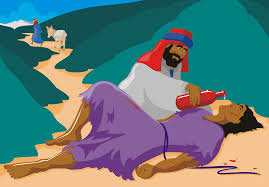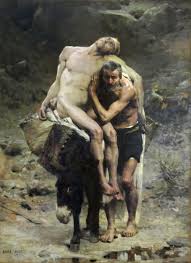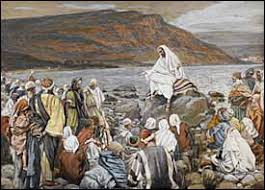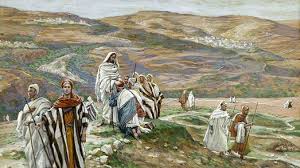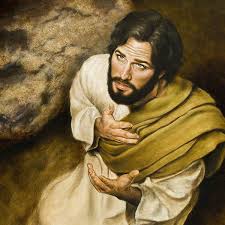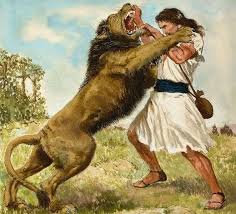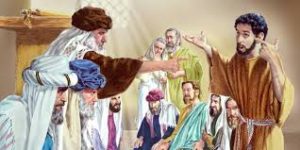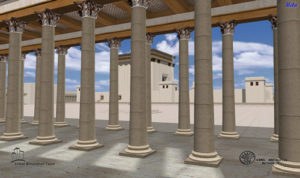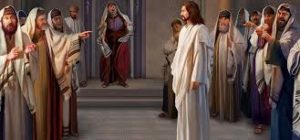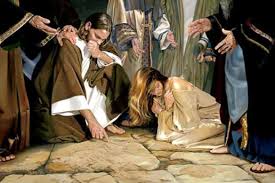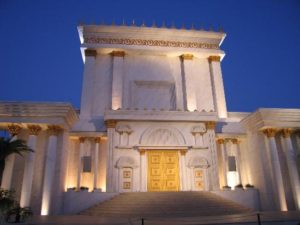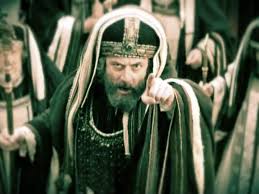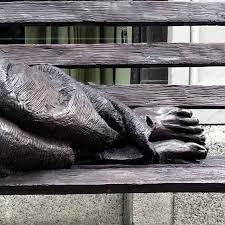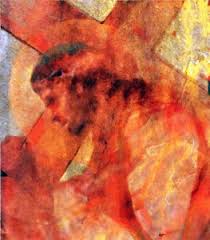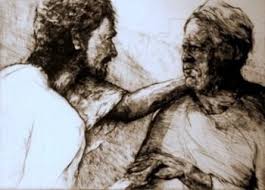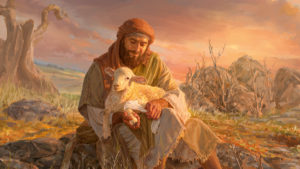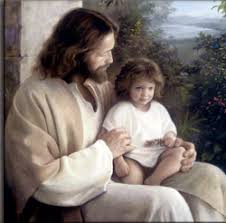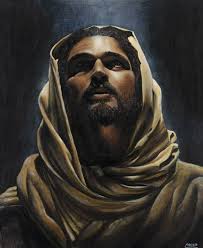Gx – Jesus in the Home of Martha and Mary Luke 10: 38-42
Jesus in the Home of Martha and Mary
Luke 10: 38-42
Jesus in the home of Martha and Mary DIG: How do these two sisters differ? Why? What was Martha’s motivation for rebuking Mary? Why is Miryam’s choice better? What is the point Jesus is making here?
REFLECT: What, to you, are good points and blind spots of both Mary and Martha? Who are you most like? Why? How can you make sure you don’t miss the good part?
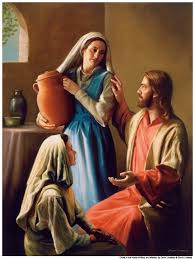
Here we meet two extraordinary women – Martha and Miryam. They lived with their brother, Lazarus, in the small village of Bethany. It was just over the Mount of Olives and within easy walking distance from Yerushalayim, less than two miles southeast of the Temple’s eastern gate. Both Luke and Yochanan record that Yeshua enjoyed hospitality in the home of this family. It seems to have been His “home base” when in Judea. Martha and Mary make a charming pair – very different in many ways, but, alike in one critical respect . . . they both loved the Meshiach. This is a consistent pattern of every woman whom the Bible treats as praiseworthy. They all point to Jesus. He was the center of heartfelt expectation for every one of the exceptional women in the TaNaKh, and He was greatly beloved by all the foremost women in the B’rit Chadashah. Martha and Miryam are timeless examples. They became precious personal friends of the Master during His earthly ministry. What is more, He had a profound love for their family. The apostle John, who knew Yeshua very well said that He loved Martha and her sister and Lazarus (Yochanan 11:5).
We have no idea how this specific household became so close to the Galilean Rabbi. Since no family relationships are ever mentioned, it seems likely that Martha and Mary were merely two of the multitudes of people who heard Messiah teach early in His ministry, extended Him hospitality, and built a relationship with Him in that way. But,a however the relationship started, it obviously developed into a deeply personal fellowship.
Without a doubt hospitality was a specific hallmark of this family. Martha is especially seen everywhere as a meticulous hostess. Here, in his account, Luke describes the family residence by saying Martha opened her home. That, combined with the fact that her name normally appears first when being listed with her siblings, strongly implies that she was the eldest sister. Lazarus seems to be the youngest of the three because his name appears last in John 11:5, and the fact that Lazarus isn’t introduced first in any narrative – even including Yochanan’s description of how he was raised from the dead.
Some think Martha’s dominant position in the household indicates that she was a widow. But, that’s an argument from silence. All we know is that these three siblings lived together, and there is no mention that any of them had ever been married. Nor is any hint given about how old they were. Scripture gives us three significant accounts of Messiah’s interaction with this family. Firstly, here in Luke 10:38-42. Secondly, we get a close glimpse of the lives of these two women in the death of their younger brother Lazarus (to see link click Ia – The Resurrection of Lazarus: The First Resurrection). And thirdly, when Mary anointed the feet of Jesus to prepare Him for His burial (see Kb – Jesus Anointed at Bethany).
As Yeshua and his talmidim were on their way, He came to a village where a woman named Martha opened her home to Him (Luke 10:38). Martha seemed to be the elder of the two sisters. Luke’s description of her behavior is one of the things that support the idea that these three siblings were still young adults.
To her great credit, hospitality was very important to Martha. She fussed over her household duties. She wanted everything to be just right. She was a meticulous and selfless hostess, and these were admirable traits. Much of her behavior was very commendable.
Miryam, on the other hand, was enthralled with the Master. He had obviously made Himself right at home, enjoying the fellowship and the conversation. No doubt the Twelve and other guests were asking Him questions, and He was giving answers that were thought provoking, authoritative and extremely enlightening. Martha had a sister called Miryam, who sat at the Lord’s feet, enthralled, listening to what He said (Luke 10:39). But Martha was distracted by all the preparations that had to be made. Ever the meticulous one, Martha went right to work.
Soon, however, Martha grew irritated with Miryam. It’s easy to imagine how she got so frustrated. She probably tried to drop a few subtle hints at first. Maybe cleared her throat loudly, or exhaled in a huff as if exasperated. Anything to remind her sister that she needed a little help. When all of that failed, she probably started cleaning right where Mary was sitting. But, nothing worked (no pun intended). In the end, she just gave up all pretense of subtlety and aired her grievance against her sister right in front of Jesus.1005 She came to Him and asked: Lord, don’t you care that my sister has left me to do the work by myself? Tell her to help me (Luke 10:40)! Martha’s complaint sounds immature and girlish. Messiah’s reply, though containing a mild rebuke, has an almost grandfatherly tone to it.
Martha, Martha, the Lord answered, you are worried and upset about many things, but only one thing is necessary, for Mary has chosen the good part, which shall not be taken away from her (Luke 10:41-42 NASB). Martha must have been utterly shocked. It didn’t seem to have occurred to her that she might be the one in the wrong, but, the little scene earned her the most gentle of admonitions from Yeshua. Luke’s account ends there, so we’re probably safe to conclude that the message penetrated straight to Martha’s heart and had exactly the sanctifying effect Christ’s words always have on those who love Him. Three important lessons emerge from Messiah’s reprimand of Martha.
First, we should honor others over ourselves (Romans 12:10; Philippians 2:3-4; First Peter 5:5). At first Martha’s outward behavior seemed to be true servanthood. But, her treatment of Miryam soon proved otherwise. Martha’s words humiliated her sister in front of the other guests. She either didn’t think about it beforehand or just didn’t care. Not only that, she assumed Mary was lazy (Romans 14:4). But in reality, Miryam was the one whose heart was in the right place. And Jesus knew it.
Martha’s behavior demonstrates how subtly and sinfully human pride can corrupt even the best of our intentions. Waiting on Yeshua and her other guests was not a bad thing. But, the moment she stopped listening to the Lord and made something else other than Him the center of her attention, she became very self-centered. This made her susceptible to several other kinds of sins as well: anger, resentment, jealousy, distrust, unkindness and a critical spirit. All of that flared up in Martha in a matter of minutes.
Worst of all, Martha’s words challenged Christ Himself: Lord, don’t you care? Did she really imagine that He didn’t care? Surely, she knew better than that. Messiah’s love for all three members of her family was obvious to everyone (John 11:5). But, Martha’s thoughts and feelings had become too focused on herself. Once she took her attention off of Jesus and began watching Mary with a critical eye, her evening was ruined.
Miryam, by contrast, was so preoccupied with thoughts of Christ that she was completely oblivious to Martha’s anger. She was camped out at His feet absorbing every word as if it was the last thing she would hear in her life. She wasn’t lazy; she merely recognized what was truly important. The Son of God Himself was a guest in her home. Listening to Him and worshiping Him at that moment were the very best use of her energies and the one right place for her to focus her attention. In other words, she had her priorities in order.
If Martha had truly preferred Mary over herself, she might have seen in her sister a depth of understanding and love for Messiah that surpassed even her own. She could have learned much from her more quiet, thoughtful sister. But, not right now. Martha had a table to set, a meal to get out of the oven, and many things she was worried and upset about. Before she knew it, her resentment of Mary had built up and she could no longer restrain herself. Her public criticism of Miryam was an ugly expression of pride.
Second, worship is the highest of all priorities for every believer. Humanly speaking, Martha’s feelings were natural and somewhat understandable. That may be one reason Messiah’s rebuke was so mild. Normally, it would have been expected for the younger sister to help in serving a meal to guests. Nonetheless, what Mary did was still better. She had discovered the most important activity: true worship and devotion of one’s heart and full attention to the KING of kings and LORD of lords. That was a higher priority even than service, and the good part would not be taken away from her, even for the sake of something as gracious and beneficial as helping Martha prepare a meal for Yeshua. Miryam’s humble, obedient heart was a far greater gift to Messiah than Martha’s well-set table.
This establishes worship as the highest of all priorities for every believer. Nothing, including even serving the Lord, is more important than listening to Him and worshiping Him. Remember what Yeshua told the Samaritan woman at the well: God is seeking true worshipers (John 4:23 NASB). The Anointed One had found one in Miryam. He would not affirm Martha’s reprimand of her because it was Mary, not Martha, who really understood that worship is a higher duty to God than works on His behalf.
It is a danger, even for people who love Jesus, that we not become so concerned with doing things for Him that we begin to neglect to worship Him. We must never allow our service to Messiah to crowd out our relationship with Him. The moment our works become more important to us than our worship, we have missed the good part.
Martha was a good person, servant, and believer. She loved the Lord and her faith was genuine. But, by neglecting the most important thing and busying herself with mere external activity, she lost her spiritual compass. Martha’s harshness toward her sister exposed the degree to which she had wandered off course. This contamination can happen to any believer. Consequently, we should always be on the lookout for this and guard our hearts.
Third, what we believe is more important than what we do. All of Martha’s preparations became a distraction from the good part that was really needed – a dynamic relationship with Jesus Christ. Good works always flow from this relationship and are the fruit of it. What we do is important, because it is the evidence that our faith is living and real (James 2:14-26). But, our relationship with Yeshua must come first, and is the only viable foundation for true and lasting works. Martha seems to have forgotten these things momentarily. She was acting as if Messiah needed her work for Him more than she needed His work on her behalf.
Martha was a noble and godly woman with a servant’s heart and a rare capacity for work. Mary was nobler still, with a gift for worship and wisdom. Both were remarkable in their own ways. If we weigh their gifts together, they are wonderful examples for us to follow.1006



